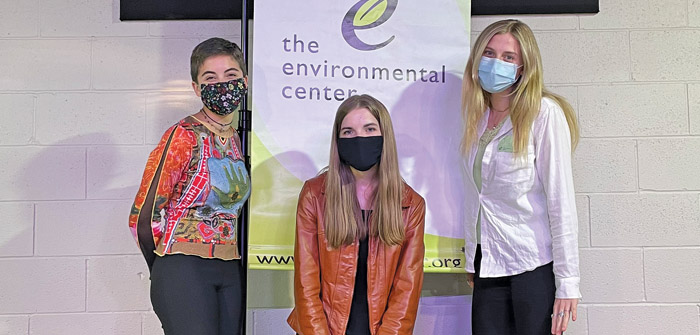(L-R) Ella Hayden, Harper Smith and Olive Nye were the youth panelists at The Environment Center’s Sustainability Awards presentation | Photo courtesy of The Environmental Center
Three youth panelists shared their thoughts about sustainability at The Environmental Center’s Sustainability Awards presentation on November 4.
Ella Hayden, Olive Nye and Harper Smith answered questions presented by Ben Ward, student at OSU-Cascades in the Natural Resources Department. Hayden is a high school senior attending Central Oregon Community College; Smith graduated from Bend High School in the spring and is taking a gap year, and Nye is a junior at Bend High School. They are all active in various organizations promoting sustainability and are considering careers where they can use their passion to make a difference in their communities.
The three panelists shared their interest in sustainability stems from the feeling of urgency to do their part to combat climate change. The three pillars of sustainability are economic, environmental and social well-being. “The three pillars are like a tripod table or stool, and if you remove one of the legs, your table or stool is no longer going to stand,” Smith said. “All three pillars are intrinsically interwoven. You can’t deal with one leg without dealing with the other two.”
Nye said sustainability is a complex issue because it impacts every group differently. “There is not one solution that will work for everyone,” Nye said. “It’s important to find the best solution for each group. Every region and person has a different solution and needs to be approached about what is best for each group.”
Nye, Smith and Hayden were all grateful to The Environmental Center for inviting them to speak about their ideas and concerns surrounding climate change. Too often, the voices at the table are privileged or older people, they shared. “It’s important to give a platform to those voices who are underrepresented,” Nye said. “I think too often the voices around sustainability and what we should do for the environment come from the majority voices, who may not be as affected by climate change as the minority voices.”
The panelist stressed the importance of educating people about sustainability, especially in schools where they began to understand the small ways they could make a difference. “The difference for our generation is the sense of urgency,” Nye said. “This is a time issue for us. It has become a lot more real for our generation. We are being affected by climate change and it’s something real in our eyes. We want to have a future, and we believe it’s our responsibility to create that future by making changes.”
Hayden said it’s important to make shopping and living sustainably something people of all backgrounds can easily incorporate into their everyday lives.
The three panelists said technology has provided their generation with more information about climate change than any other generation. “This is something we not only want to talk about but something we want to take action on,” Nye said.
Realizing many people feel powerless to bring about change, the three panelists argue the opposite. They are determined to empower their generation on what they can do to make a difference by providing examples of what they can do. “We have so much information at our fingertips so when we talk about the change we want to see, we can educate ourselves and find out how to make a difference,” Hayden said. “I encourage people to get involved with local organizations to make the changes they want to see. The small things add up.”
The three panelists hope by sharing their commitment to make a difference, they can serve as a bridge to older generations. “Too often, people don’t take youth seriously about these topics,” Hayden said. “They think this needs to be handled by older people, but the older people aren’t handling it, so we are trying to fix it.”
They emphasized it takes courage and commitment to discuss what is happening socially, economically and environmentally in regard to sustainability. Despite the challenges facing their generation due to climate change, the panelists are cautiously optimistic change can take place.
Harper said her generation is ready to tackle the challenge of climate change with new innovative ideas. “We need to recognize differences are not a negative thing, but instead they are necessary to bring various ideas and change on how we do things,” she added.





